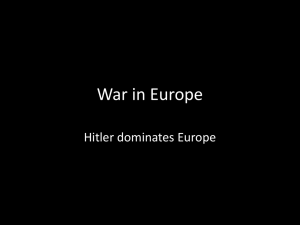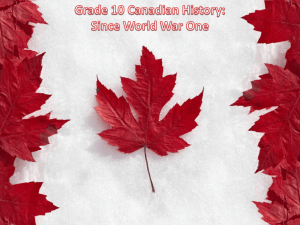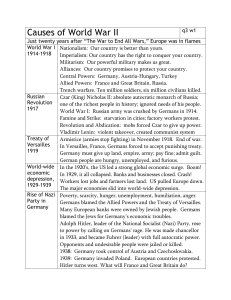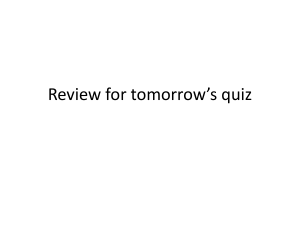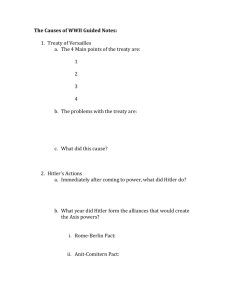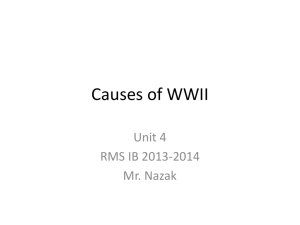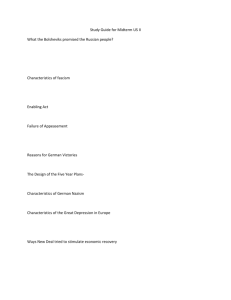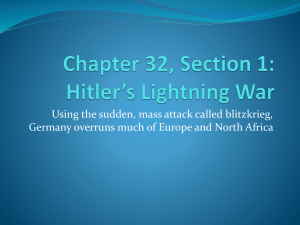Dictators Expand Territory = IMPERIALISM
advertisement
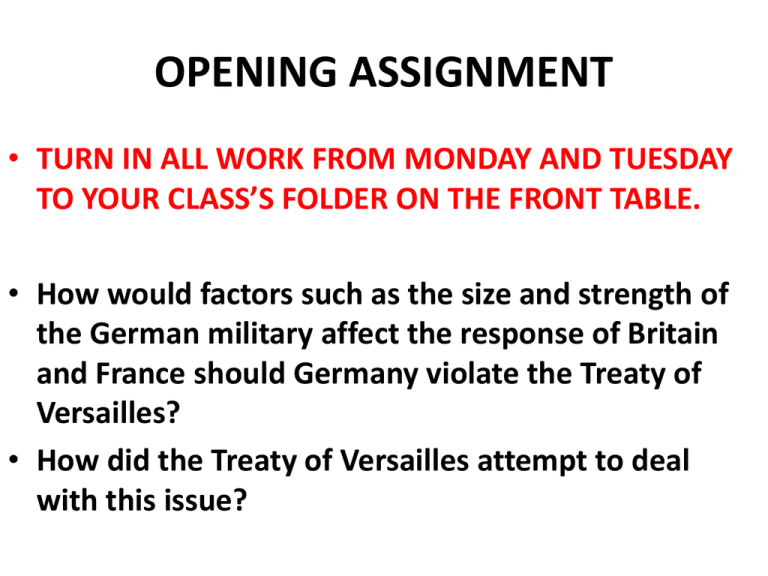
OPENING ASSIGNMENT • TURN IN ALL WORK FROM MONDAY AND TUESDAY TO YOUR CLASS’S FOLDER ON THE FRONT TABLE. • How would factors such as the size and strength of the German military affect the response of Britain and France should Germany violate the Treaty of Versailles? • How did the Treaty of Versailles attempt to deal with this issue? Essential Learning Goal & Learning Targets • Essential Learning Goal: – The Second World War caused dramatic changes for the citizens of the US and to the US’ position as a world power. • Learning Targets: – I can explain, in chronological order, the steps Hitler took to expand Germany. – I can identify the British leaders Neville Chamberlain and Winston Churchill by their opinions on the Munich Agreement. – I can identify the terms; nonagression pact, blitzkrieg, and Axis Powers. – I can describe how World War II began in Poland and spread to France and Britain. Germany Begins Conquests • 1936 – Hitler moves troops into the Rhineland (German region near the French border) • The Treaty of Versailles said no German troops were allowed here. • French Gov’t and League of Nations – TOOK NO ACTION German-Italian Alliance • Germany and Italy form the Axis Powers • Now – two dictators with stated goals of expansion were united. • Axis Powers help Spain’s Fascist military overthrow its elected government in the Spanish Civil War. Mussolini and Hitler Hitler begins his own Conquests • 1938 – Hitler and the Germans annex Austria (many Austrians spoke German and welcomed becoming a part of Germany) • But Hitler and the Germans were expanding – and the Treaty of Versailles told them not to. The Sudetenland • After taking Austria Hitler wants to bring more Germanic people under his control. • His next conquest is the Sudetenland in Czechoslovakia • The Czechs did not want to give this area to Germany – nor did France and Russia Germany’s Expansion “Appeasement” at Munich • The British step in to offer peace in an effort to avoid war. • British Prime Minister Neville Chamberlain meets with Hitler in Munich, Germany and create the Munich Agreement – They agree to give Hitler the Sudetenland – Hitler has to promise he is done seeking territory Reactions to Munich Agreement • Neville Chamberlain, the British Prime Minister who came up with the agreement, said that he had achieved “peace in our time” • Winston Churchill, the future Prime Minister, said: “Britain and France had to choose between war and shame. They chose shame. They will get war, too.” Hitler breaks his promise: Germany Starts the War • After being given Sudetenland – Hitler takes the rest of Czechoslovakia • Hitler signs a secret Non-Aggression Pact with Stalin and the Soviet Union (they agree to not make war on each other) – now France and Britain have lost an ally. • Immediately after on September 1, 1939 – Germany invades Poland (France & Britain declare war on Germany) WWII officially begins. World War • September 1, 1939- German invasion of Poland begins. • September 3, 1939- Britain & France declare war on Germany. • April 9, 1940- Denmark and Norway fall to Germany’s surprise invasion. • May 10, 1940- German invasion of France begins by passing through Belgium and the Netherlands. • May 27 – June 4, 1940- The British Expeditionary Force and remaining French forces are evacuated from Dunkirk, France to southern England. • June, 1940- France surrenders to the Germans. • August 12, 1940- Germany begins airborne attacks on Great Britain called the Battle of Britain. German Conquests in Europe Britain holds fast. • Britain remained the last European power to hold out against the Germans. • This was partially due to the British development and use of RADAR, which allowed the Royal Air Force to combat the German Luftwaffe (air force). • Listen to this speech given by Winston Churchill in May 1940 regarding the coming German invasion. In summary: Causes of WWII: similar to the causes of WWI. Nationalism- (Mussolini and Hitler nationalistic) Militarism- Germany, Italy and Japan spent large amounts of money building up the military then used those militaries as a tool of diplomacy. They also formed the Axis Powers. Imperialism- Larger countries continued to try to gain more land overseas (ex: Italy takes Ethiopia and Japan takes Manchuria and Germany takes Austria, Czechoslovakia, and Poland.) In summary: Causes of WWII Continued. Treaty of Versailles- Made Germans angry. The Great Depression- made people very poor and desperate for change. People were more willing to follow dictators. Daily Review What nations were taken by the Germans under the leadership of Hitler? What invasion marks the beginning of the Second World War? How were the British able to survive the attacks of the German air force during the Battle of Britain? Which British leader did we listen to explain how America would play a role in saving Britain? How did this speech represent the shift in the Great Powers (nations) of the world?
